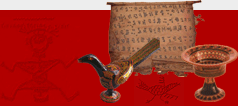|
| 您的位置:首页 --> 与会学者
--> 论文提要 |
|
由灵牌马都的待遇来解读大凉山彝族的灵魂观
Liangshan Nuosu Ideas of Souls and Spirits as Seen through
the Treatment of the Maddu Memorial Tablet
|
樊秀丽、藤川信夫 Fan Xiuli & Fujikawa Nobuo
日本大阪大学人文学科研究生院
Graduate School of Human Sciences, Osaka University, Japan
【摘要】大凉山诺苏是彝族的一个支系,散居在中国西南部四川省的山岳,从事着刀耕火种的半农半牧的生活。由于受山高谷深等自然条件的阻碍,他们与外界极少接触,几乎没有受到外来文化的影响,形成了自己独特的文化。
灵魂不灭的观念,构成了大凉山彝族的日常生活和各种礼仪的基础。他们对死者和祖先崇拜及其送葬礼仪,已形成一个体系。其核心是以独特的祖界(祖先们的世界)以及人死归祖的信仰。通过死者的子孙对死者的祭祀,把对祖先崇拜具体化了。在这些祭祀活动里,特别是作为死者或祖先的化身灵牌马都有着重要的意义。马都的种类和待遇不仅反映了大凉山彝族人们的灵魂观,还揭示了与所谓的三魂说和三灵说的密切关系。而且,由马都的待遇还可看出大凉山彝族社会组织的原有状态。本文从大凉山彝族送葬礼仪等诸仪式上对马都的待遇入手,以此来弄清其灵魂观体系的特征。
关键词: 灵魂观 大凉山彝族 灵牌马都 待遇
Abstract
Dalangshan Nuosu is a subgroup belongs to the Yi ethnic
minority, living scatteredly in remote mountains in southwest
of Sichuan province. They lead a life of simplicity, partly
slash-and-burn cultivation, and making their living both
from agriculture and from stock-raising. Impeded by the
natural conditions of high mountains and deep valleys, they
have few contacts with outside world and almost never suffered
the encroachment of other cultures, so they have formed
their own unique culture. The concept of the immortal Spirit
and Soul constituted the foundation of Dalangshan Nuosu’s
daily life and folkways. The adoration for the dead and
their ancestors, and the etiquette and custom of attending
funeral has become a total system. The core of it is the
unique belief of the ancestral realm where everyone will
go back to join their ancestors after their death. Through
the way that descendents offer the sacrifices to their ancestor,
the worship of ancestors has been made concrete. In these
sacrifice activities, Maddu Tablet Making means a lot because
it is the avatar of the past and ancestors. The variety
and treatment of Maddu not only reflects the Dalangshan
Nuosu’s view of soul, it also reveals the close relationship
between the so-called “Theory of Three Souls” and “Theory
of Three Spirits.” Besides that, from the treatment of Maddu
Tablet, we can also see the original state/condition of
the Dalangshan Nuosu’s social organization. This article
focuses on the treatment of Maddu in the etiquette and custom
of attending funerals, to make clear the characteristics
of their system of soul concept.
Keywords: Spirit and Soul─Dalangshan Nuosu Yi─Maddu Memorial
Tablet、
|
|
作者简介:
樊秀丽,女,中国人,大阪大学人間科学研究科,外国人招聘研究员,博士(学术)。已出版专著《通过大凉山彝族的丧葬礼仪和灵魂观看归属集团意识的形成》,勉诚出版,2004年。
藤川信夫,男,日本人,大阪大学人间科学研究科,副教授,博士(教育学);教育思想史学会编委会委员;研究领域:教育哲学、历史的教育人间学、教育思想史。代表作《教育学的神话学的方法研究》,风间书房,东京,1998年。
About the Authors:
Fan XiuLi, female, Chinese, Ph.D. in Cultural Education,
Visiting Research Fellow at the Graduate School of Human
Sciences, Osaka University, Japan. She has published personal
book titled Building of Ethnic Identity in the Yi Society
in Daliangshan China observed through their Funeral Ceremony
and Ideas of Soul Tokyo, 2004.
Fujikawa Nobuo, male, Japanese, Ph. D. in Education,
Associate Professor at the Graduate School of Human Sciences,
Osaka University, Japan. He is the Member of Editorial Board
of the History of Educational Thought Society. Main research
scope: philosophy of education, historical anthropology
of Education, history of educational thought. He is the
author of A Study on Mythological Method in Education, Tokyo,
1998.
|
|
|





